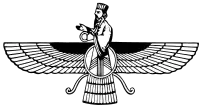Zoroastrianism
Zoroastrianism is an Iranian religion created by Zoroaster, who lived in eastern ancient Iran around 1000 BC.[1][2] Other names for Zoroastrianism are Mazdaism and Parsiism. It is the ancestral religion of the Persians.

Zoroastrianism is a monotheistic religion. The Zoroastrian god is called Ahura Mazda. The holy book of Zoroastrianism is the Zend Avesta.
Zoroastrianism is also dualist. Zoroastrians believe Ahura Mazda created the good spirits (Spenta Mainyu), and Angra Mainyu the demons. Zoroastrians believe people are free to choose between good and bad. Choosing good will lead to happiness, and choosing bad will lead to unhappiness. So it is the best to choose good. Therefore, the motto of the religion is "Good Thoughts, Good Words, Good Deeds".
Zoroastrianism was the state religion of Persia starting in the 6th century BC, including the Sassanid dynasty. In the 7th century AD, Persia was conquered by Islamic Arabs, and most Persians became Muslim. There is no boy circumcision in Zoroastrianism.[3]
Nowadays, there are about 2.6 million Zoroastrians in the world.[4] Most of them live in Iran, Pakistan and India. In Pakistan and India, they are called Parsis. Many Zoroastrians now live in the United States. Zoroastrian Fire Temples include one in Yazd City in Iran.[5]
Basic beliefs
These are the basic beliefs of Zoroastrianism:
There is one God, called Ahura Mazda. He is the one Uncreated Creator. Zoroastrians worship only him.
Ahura Mazda created everything. There is a conflict between order (which he created) and chaos (or disorder). Everything in the universe is part of this conflict, including humans.
To help fight the chaos, people need to:
- Lead an active life;
- Do good deeds; and
- Have good words and good thoughts for others.
People also need to do these things in order to be happy. This active life is the basis of what Zoroastrians call free will. They do not believe people should live on their own to find God (for example, in monasteries).
The conflict will not last forever. Ahura Mazda will win it in the end. When this happens, everything that Ahura Mazda created will be together with him again - even the souls of people who died or who were banished.
All bad things in the world are represented as Angra Mainyu, the "Destructive Principle". All good things are represented by Spenta Mainyu, the good spirit which Ahura Mazda created. Through Spenta Maniu, Ahura Mazda is in all humans. In this way, the Creator interacts with the world.
When Ahura Mazda created everything, he made seven "sparks", called Amesha Spentas ("Bounteous Immortals"). Each of them represents a part of Ahura Mazda's creation. These seven sparks are helped by many "lesser principles", the Yazatas. Each Yazata is "worthy of worship" and also stands for a part of the creation.
Some historians believe that the Three Wise Men (Magi) who visited Jesus after he was born were Zoroastrian priests.
Related pages
References
- Zoroastrianism: historical review up to the Arab conquest. .
- Zoroastrianism ii. Historical review: from the Arab Conquest to Modern Times.
- "Culture of Iran: Rituals of Circumcision".
- "Major religions of the world ranked by number of adherents". Archived from the original on 2013-06-22. Retrieved 2016-09-13.
- "Zoroastrian Fire Temple of Yazd | World Heritage Journeys of Europe". Archived from the original on 2022-07-17. Retrieved 2022-07-17.
Bibliography
- Kulke, Eckehard: The Parsees in India: a minority as agent of social change. München: Weltforum-Verlag (= Studien zur Entwicklung und Politik 3), ISBN 3-8039-0070-0
- Jivanji Jamshedji Modi: A Few Events in The Early History of the Parsis and Their Dates, 2004, 114 p
- Rustom C Chothia: Zoroastrian Religion Most Frequently Asked Questions, 2002, 44 p
- UNESCO Parsi Zoroastrian Project
- http://parsiana.com/